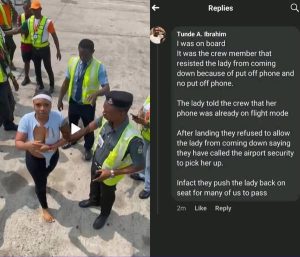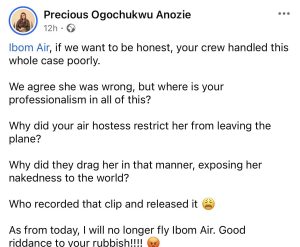Ibom Air Case; Safety, Fairness— Aggressive Conduct Meet Assault
The recent confrontation between Ibom Air and passenger Comfort Emmason has sparked a storm—not just about what happened that day, but about how Nigeria’s aviation system handles conflict, safety, justice and the selective way of justice in the Nigerian aviation system.
Yes, the incident was mishandled by Ibom Air. Aggression and physical force have no place as a first resort in air travel, and no airline should ever cross that line. But accountability is not one-sided. Both passengers and crew must answer for their actions when safety is at stake.
What’s clear is that this is no longer just about one passenger’s comfort, Emmason and one airline employee. It’s a stress test for Nigeria’s aviation safety standards, regulatory transparency, and the industry’s commitment to protecting everyone—passengers and crew alike.
Some passengers on board that aircraft have said that crew members stop comfort emmason from disembarking when they landed in Lagos.
The Questions That Won’t Go Away
-
When does safety truly justify the use of force?
-
Who investigates these incidents—and how independent are they?
-
Do existing rules protect both passengers and crew equally?
-
Are life bans and other severe sanctions fair, and when should they apply?
The regulator’s version:
According to the Nigerian Civil Aviation Authority (NCAA), Emmason refused to switch off her phone, made disruptive gestures, and blocked an aircraft exit after landing. She was removed and charged in court.
Some passengers on board claim the crew escalated the situation instead of calming it. Others say they acted appropriately to preserve order.


Did the crew’s actions meet proportionality standards? Were all disembarkation protocols followed? The lack of certainty has fueled calls for an independent, public investigation.
Protecting lives will always come first—but proportionality matters. Clear rules should define when restraint is warranted, who can apply it, and what methods are acceptable.
Without timely public reporting, rumours and speculation take over. Every serious incident should come with open disclosure of investigative steps, findings, and corrective actions.
Evidence—not status—should determine consequences. A fair penalty framework deters future misconduct, no matter who’s at fault.
Airlines should not police themselves in serious cases. Independent and regulatory investigations must be standard practice, with results made public.



